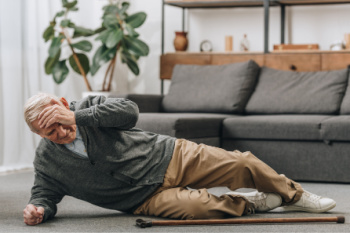
As people age, changes in the feet, toes, and ankles can make it harder to stay steady, increasing the risk of falling. Balance depends on strong muscles, flexible joints, and healthy nerves that help the brain sense body position. When nerve damage, arthritis, fallen arches, or toe deformities occur, they may interfere with these functions. Loss of sensation in the feet, often linked to diabetic neuropathy, can make it difficult to detect changes in walking surfaces. Stiff joints or painful foot problems may limit the natural movement needed for stability. Even subtle foot issues can affect walking patterns and overall balance. A podiatrist can evaluate foot structure, nerve function, and joint health to identify causes of instability. Depending on the findings, treatment may include custom orthotics, supportive footwear, or surgery to correct deformities. If you notice a loss of balance or have fallen and injured your foot or ankle, it is suggested that you schedule an appointment with a podiatrist who can treat various foot conditions, and guide you on effective fall prevention tips.
Preventing falls among the elderly is very important. If you are older and have fallen or fear that you are prone to falling, consult with Pedram Aslmand, DPM from Advanced Foot and Ankle Center. Our podiatrist will assess your condition and provide you with quality advice and care.
Every 11 seconds, an elderly American is being treated in an emergency room for a fall related injury. Falls are the leading cause of head and hip injuries for those 65 and older. Due to decreases in strength, balance, senses, and lack of awareness, elderly persons are very susceptible to falling. Thankfully, there are a number of things older persons can do to prevent falls.
How to Prevent Falls
Some effective methods that older persons can do to prevent falls include:
- Enrolling in strength and balance exercise program to increase balance and strength
- Periodically having your sight and hearing checked
- Discuss any medications you have with a doctor to see if it increases the risk of falling
- Clearing the house of falling hazards and installing devices like grab bars and railings
- Utilizing a walker or cane
- Wearing shoes that provide good support and cushioning
- Talking to family members about falling and increasing awareness
Falling can be a traumatic and embarrassing experience for elderly persons; this can make them less willing to leave the house, and less willing to talk to someone about their fears of falling. Doing such things, however, will increase the likelihood of tripping or losing one’s balance. Knowing the causes of falling and how to prevent them is the best way to mitigate the risk of serious injury.
If you have any questions, please feel free to contact our offices located in Long Beach, CA . We offer the newest diagnostic and treatment technologies for all your foot care needs.

